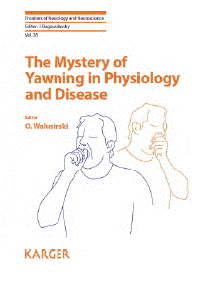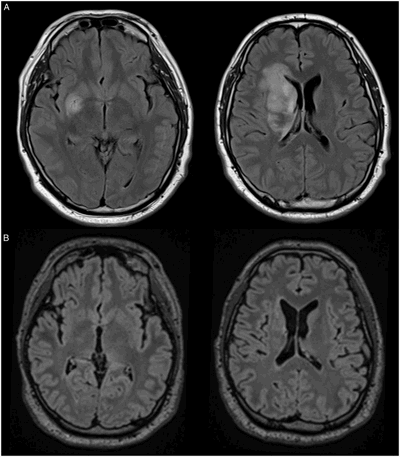

-
|
- mise à jour
du
- 21 janvier
2023
- The
Neurohospitalist
- 2024;14(1):104-105
- Scholarpedia
|
- Parakinesia
Brachialis Oscitans
- and
Excessive yawning From Tumefactive
Demyelination
- Tsai C-C, Lee JD, Chen T.
- The University of British
Columbia Faculty of Medicine, Vancouver,
Canada
|

|
-
- Tous
les articles sur la parakinésie brachiale
oscitante
- All
articles about parakinsia brachialis
oscitans
-
- Abstract
- The authors present a case and video of a
31-year-old man with biopsy-confirmed
tumefactive demyelination affecting the right
internal capsule causing left hemiplegia,
excessive yawning, and the curious but well
described phenomenon of parakinesia brachialis
oscitans (PBO) with transient tonic elevation of
his paralyzed arm while yawning. PBO is most
commonly reported in ischemic stroke with
internal capsule or pontomedullary brainstem
lesions. Our case uniquely demonstrates this
phenomenon in the case of tumefactive
demyelination. They also highlight excessive
yawning which has also been described in
multiple sclerosis.
-
- Résumé
- Les auteurs présentent le cas avec sa
vidéo d'un homme de 31 ans atteint d'une
démyélinisation tumorale
confirmée par biopsie touchant la capsule
interne droite et provoquant une
hémiplégie gauche, des
bâillements excessifs et le curieux
phénomène, bien décrit, de
la parakinésie brachiale oscitante (PBO)
avec une élévation tonique
transitoire de son bras paralysé pendant
qu'il bâille. La parakinésie
brachiale oscitante est le plus souvent
rapportée dans les accidents vasculaires
cérébraux ischémiques avec
des lésions de la capsule interne ou du
tronc cérébral
pontomédullaire. Leur cas démontre
de manière unique ce
phénomène dans le cas d'une
démyélinisation tumorale. Ils
soulignent également que des
bâillements excessifs ont également
été décrits au cours de la
sclérose en plaques.
-
 -
- A 31-year-old previously healthy male
presented to hospital with five days of
progressive left-sided ataxic hemiparesis two
weeks after upper respiratory tract infection.
Examination demonstrated left hemiplegia. MRI
revealed mass-like abnormality involving deep
right subcortical white matter.
-
- Lumbar puncture showed lymphocytic
pleocytosis (15 cells/uL) with oligoclonal
banding.
-
- Stereotactic biopsy revealed focal
demyelination without histopathological evidence
of lymphoproliferation or vasculitis.
-
- He initially had frequent yawning with
concomitant transient tonic elevation of his
paralyzed arm. Parakinesia brachialis oscitans
(PBO) is mostly reported in ischemic stroke with
internal capsule or pontomedullary brainstem
lesions. It is thought to involve release of
subcortically regulated automatisms from
cortical inhibition. It is proposed that strong
contraction of respiratory muscles during
yawning generates proprioceptive signals
reaching the anterior horn cells of C4-C8,
resulting in involuntary movement of the
affected upper limb.
-
- Cortical release may also lead to excessive
yawning seen in patients with multiple
sclerosis. Yawning is postulated to modulate
cortisol levels, signal brain cooling, and
promote clearing of cerebrospinal fluid into
central venous structures. Yawning is also
thought to be the somatization of a
disinterested emotional state, leading to upper
limb stretching movements via reticulospinal
tracts. Insufficient detection of cortisol
levels in stroke may result in the failure of
the brainstem to respond to changes in cortisol
level, preventing the inhibition of arm
movement.
-
- This video uniquely demonstrates excessive
yawning and PBO in a patient with tumefactive
demyelination. Following high-dose intravenous
corticosteroids and mitoxantrone, he had
complete motor recovery which was sustained at
18-month follow up.
-
- References
-
- 1. Walusinski O,
Bogosslavsky J, Neau JP. Hand up ! yawn and
raise your arm. The International Journal of
Stroke 2010;5(1):21-27.
-
- 2. Chowdhury A,
Datta AK, Biswas S, Biswas A. Parakinesia
Brachialis Oscitans &endash; a Rare Post-Stroke
Phenomenon. Tremor and Other Hyperkinetic
Movements. 2022; 12(1): 6.
-
- 3. Ertekin
C, Bulbul NG, Uludag IF, Tiftikcioglu BI, Arici
S, Gurgor N. Electrophysiological
association of spontaneous yawning and
swallowing. Exp Brain Res.
2015;233(7):2073-80
-
- 4. Isis Claire
Z.Y. Lim, Shermyn Neo. Parakinesia
Brachialis Oscitans: Old Sign, New Findings.
Stroke
2022;53:e60-e62.
-
|
|



